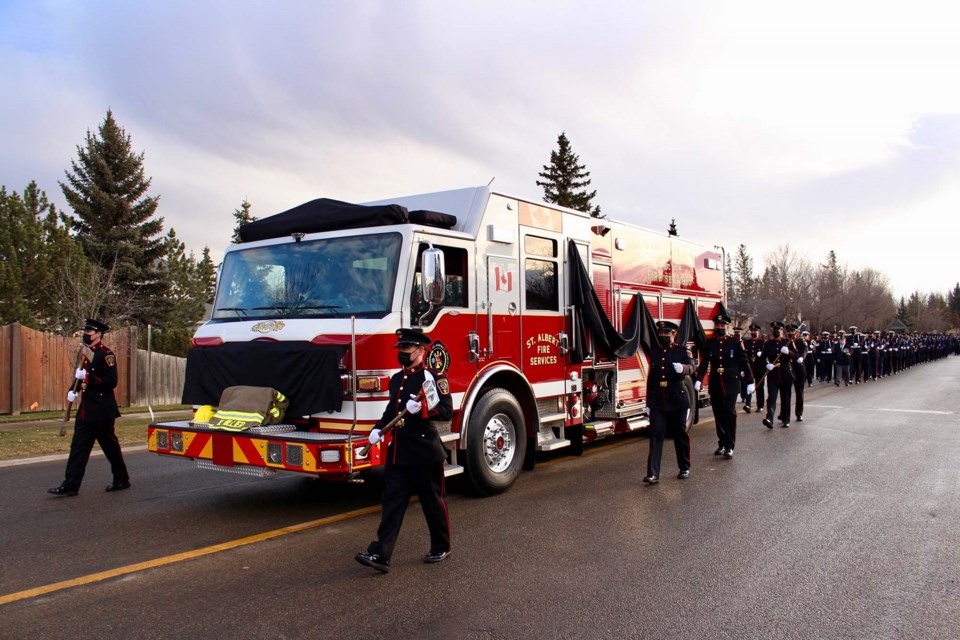First responders suffer from mental-health struggles at a much higher rate than the rest of the population, experts say.
Those working on the front lines and responding to serious events have a higher likelihood of suffering from mental-health disorders, due to the repeated exposure to traumatic events, said Julius Brown, director of Occupational Stress Injury Canada, a community-based peer support initiative created through a partnership between the Canadian Mental Health Association (SK) and The Royal Canadian Legion (Saskatchewan Command).
“It's higher than the normal populace comparatively,” Brown said.
According to the Canadian Association of Mental Health, firefighters are exposed to significant trauma at work and are generally not taught skills that will help them protect their mental health. As a result, they are at a high risk for developing mental illness, which contributes to a rate of suicide in firefighters that is 30-per-cent higher than in the general population.
Overall, only two per cent of Canadians will experience post-traumatic stress disorder (PTSD) in their lifetime, while first responders will experience it at double this rate, according to the Canadian Centre for Suicide Prevention.
Paramedics are at an even higher risk, with 22 per cent of them developing PTSD in their lifetimes, according to the Canadian Centre for Suicide Prevention. In St. Albert the fire and paramedic units are integrated, with firefighters trained as EMTs and paramedics who respond to a variety of emergency calls.
Brown said it is the repeated exposure to stressful events that contributes to such high rates of mental illness in these professions.
And those who have a military background who then go on to work as first responders — a common path for military veterans, Brown said — are even more likely to develop mental illness.
“A lot of veterans will seek out this type of employment because it's something that they're kind of used to,” Brown said.
If those people also had a childhood trauma, they are very likely to develop what Brown calls an occupational stress injury.
A singular exposure to one event doesn’t typically result in an occupational stress injury, such as PTSD, anxiety, or depression, Brown said, but the repeated exposure to stress raises the baseline stress level for the individual and soon they won’t be able to get down to a low stress level.
Over time this results in high stress all the time and the development of mental illness.
Dr. Nicola Cherry, a researcher at the University of Alberta who has studied the link between mental illness and first responders, talked to 1,000 firefighters who worked on the Fort McMurray fire in 2016.
Around one in five had symptoms that were consistent with PTSD, Cherry said, with 15 per cent suffering from anxiety disorders and 14 per cent suffering from depressive disorders.
“A lot of the PTSD seemed to be related, not so much to the to the Fort McMurray fire, but the sort of continuous stressful events that a first responder comes across,” Cherry said.
Some of the symptoms of these disorders include things such as irritability, trouble sleeping, short temper, anger, being nervous, or suffering from anxiety.
Catching these illnesses early is key to effective treatment, Brown said. Early symptoms vary from person to person, such as “generally being irritable, and I would definitely pay close attention to sleep difficulty,” Brown said.
When someone notices they are starting to exhibit some of these symptoms, Brown said they should seek help immediately, because catching mental illness early can mitigate further damage.
Once a problem is recognized, peer support programs, like the one run at the St. Albert fire department, can be an effective tool in supporting those who are suffering,
Cherry said the reason peer support is effective is because mental-health workers don’t understand the experience of being a firefighter — “Peer support, where it comes from somebody who has had some training in providing peer support, but it's coming from a colleague, a firefighter who knows all about firefighting, about the pressures and knows about the stigma,” Cherry said.
And that stigma is slowing going away in the first responder communities, Cherry said. Many fires services now have annual mental-health support training courses and peer support programs to help give staff skills to identify problems.
If first responders are suffering from mental illness, it can take a big toll on their families, too, Brown said.
Like any illness, it impacts the entire family and as one spouse gets sick, their partner is usually the first person to notice a difference in their behaviours.
“That's why it's so important to help the entire family because, you know, if a spouse gets the kind of support that they need to support their loved one as a caregiver, then they become more trauma informed,” Brown said.
Spouses can help create a safe space at home, Brown said, so the sick partner is able to relax more.
But spouses can experience vicarious trauma through their partner and become sick themselves, along with suffering from compassion fatigue and burnout.
“That's why we advocate that the spouse or partner gets help, too, because ultimately, we're trying to save the family as well,” Brown said.
Anyone who needs mental-health support can call the 24-hour distress line at 780-482-4357.
If you or a loved or is in immediate danger, call 911.
The Canadian suicide prevention service offers a 24-hour help line at 833-456-4566.



